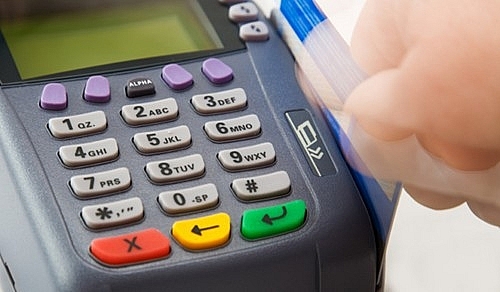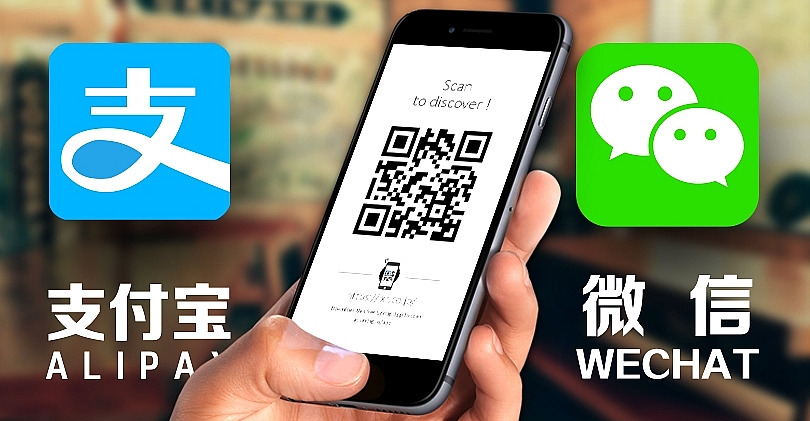Vietnamese currency security faces big challenges from technology
 |
| $30,837 was illegally transferred to China via POS equipment in Quang Ninh |
Most recently, the inspectors of the State Bank of Vietnam’s Quang Ninh branch detected a local store using illegal POS equipment to transfer VND700 million ($30,837) to China without any Vietnamese intermediate banks. Chinese tourists used their domestic bank cards or e-wallets such as Alipay and WeChat Pay to pay.
These POS devices directly connecting to AliPay, WeChat Pay, and Chinese banks are released by some Chinese banks, but have been illegally installed in Vietnam. Thanks to these technologies, these stores could be used as bases for money laundering and other illegal activities.
Not only in Quang Ninh but also in other popular tourist destinations, including Nha Trang (the central province of Khanh Hoa) and the central city of Danang, many stores and private hotels accept payment via WeChat Pay and AliPay under illegal forms.
| Alipay signs with Napas to take on Vietnam |
In November last year, Alibaba Group signed with the National Payment Corporation of Vietnam (NAPAS) to supply financial services, which allows Chinese arrivals to pay via the Alibaba application at many stores in Vietnam. Afterwards, Vi Mo Technology JSC’s e-wallet VIMO announced becoming the first intermediate payment unit allowing Chinese tourists to pay in VND via the WeChat Pay application.
Loss of tax income
When first entering Vietnam, the representatives of Alipay and WeChat Pay promised to boost Chinese tourists’ spending potential, creating a huge income from these arrivals.
 |
| AliPay and WeChat Pay are the two main payment applications used by Chinese people |
However, in fact, representatives of many tourism companies revealed that many Chinese tours to Vietnam are free of charge and have minimum accommodation expenses.
Arrivals in these tours are only allowed to do shopping and sightseeing at attractions and shopping destinations appointed by their tourism companies.
“These shopping destinations are owned by Chinese people living in Vietnam and previously got in touch with tourism companies organising these tours. Therefore, despite the fact that Chinese visitors do increasing their spending, the revenue does not go to Vietnamese companies, but Chinese companies,” said Tran Anh Tuan, director of Tuan Anh Tourism Company.
Furthermore, stores and shopping destinations sneakily receiving payments in Chinese currency via AliPay and WechatPay lead to the sales revenue being transferred to China without paying tax and evading the supervision of Vietnamese authorities.
Threatening currency security
| AliPay and WeChat Pay’s abetting illegal payments need to be handled as soon as possible or they will continue to be a security threat. |
Many financial experts warned that the illegal payment method is quite common and affect the country’s currency security. This is a kind of on-the-spot export, but does not get money for Vietnam.
According to Nguyen Thanh Ha, lawyer of SB Law, the payments violate the regulations of foreign exchange management and causes losses in tax income.
Currently, the Quang Ninh People’s Committee and local authorities are jointly investigating illegal money transfers to China from many stores in Halong city and Mong Cai gateway, which are popular among Chinese visitors.
In addition, the committee also said that local authorities will intensify supervision at local stores and require the stores to stick labels claiming “no payment via illegal POS devices.”
However, the question remains: how many illegal POS devices and illegal points of sale using AliPay and WeChat Pay are left? Clearly, illegal payments eat into the incomes of domestic e-wallets and intermediate banks.
What the stars mean:
★ Poor ★ ★ Promising ★★★ Good ★★★★ Very good ★★★★★ Exceptional
Related Contents
Latest News
More News
- Cashless payments hit 28 times GDP in 2025 (February 04, 2026 | 18:09)
- SSIAM and DBJ launch Japan Vietnam Capital Fund (February 04, 2026 | 15:57)
- Banks target stronger profits, credit growth in 2026 (February 04, 2026 | 15:43)
- Vietnam on path to investment-grade rating (February 03, 2026 | 13:07)
- Consumer finance sector posts sharp profit growth (February 03, 2026 | 13:05)
- Insurance market building the next chapter of protection (February 02, 2026 | 11:16)
- NAB Innovation Centre underscores Vietnam’s appeal for tech investment (January 30, 2026 | 11:16)
- Vietnam strengthens public debt management with World Bank and IMF (January 30, 2026 | 11:00)
- Corporate bond market poised for stronger growth cycle (January 28, 2026 | 17:13)
- Vietnam's IPO market on recovery trajectory (January 28, 2026 | 17:04)

 Tag:
Tag:
























 Mobile Version
Mobile Version